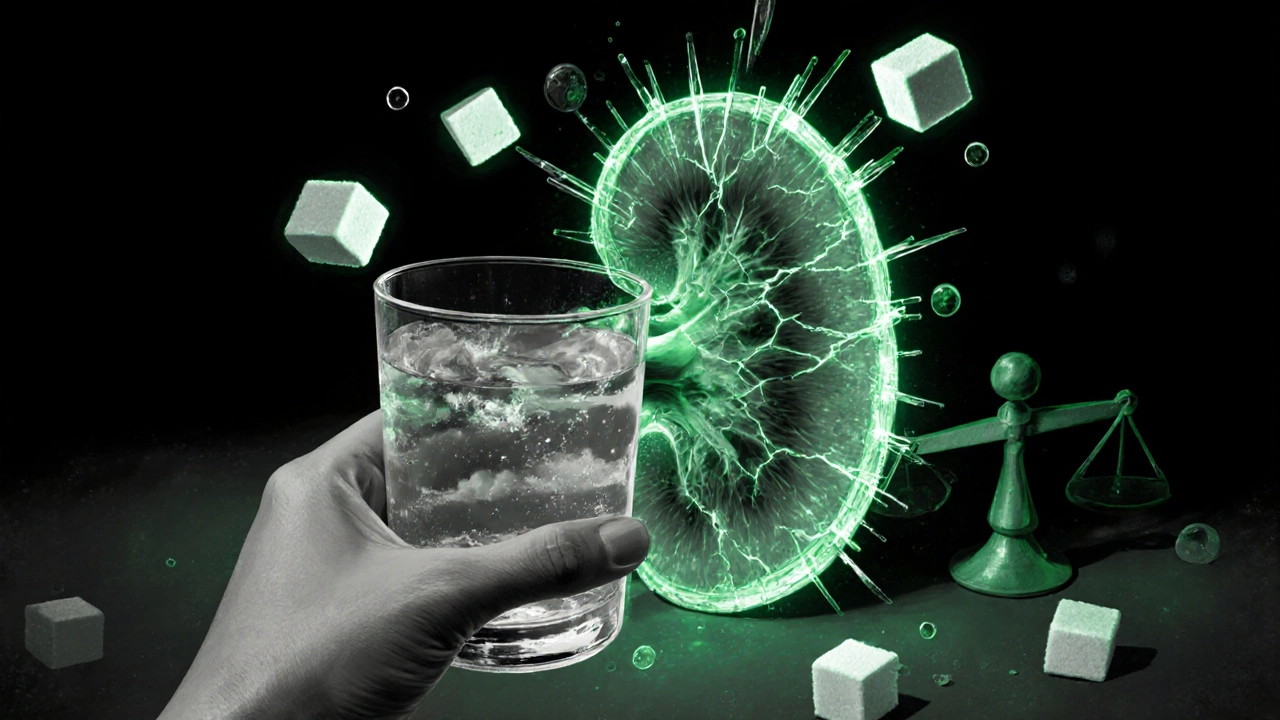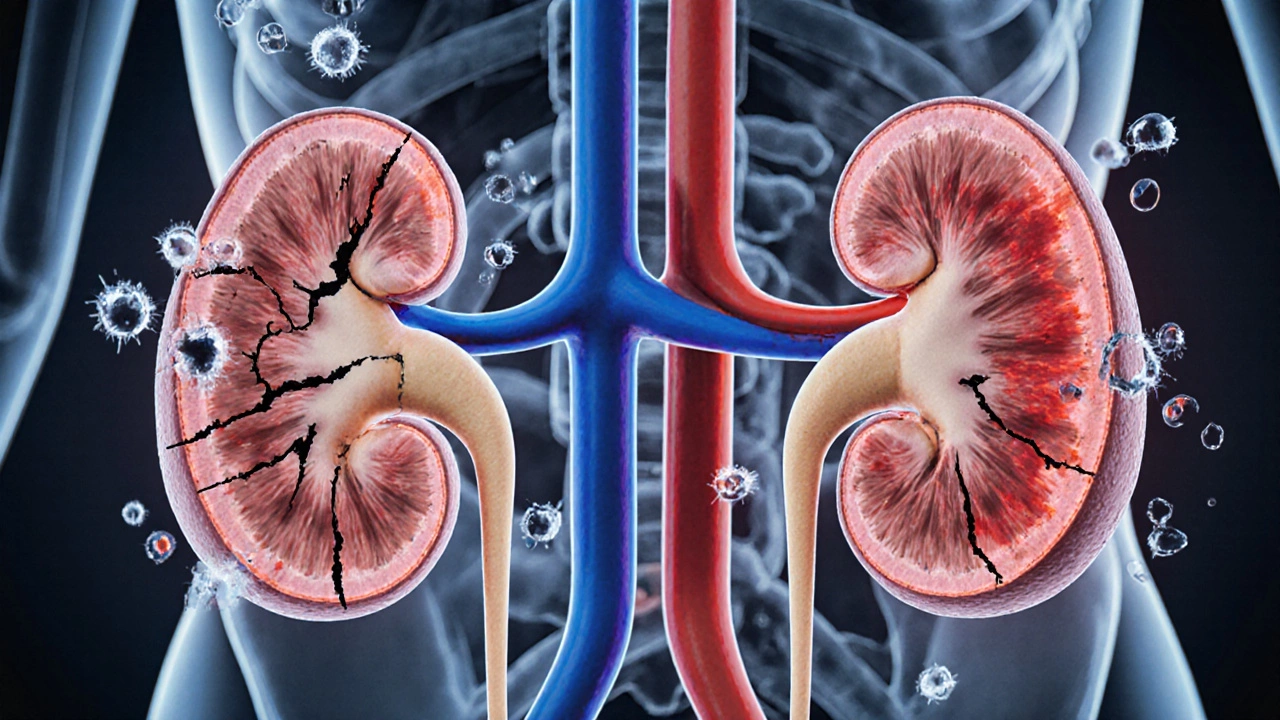Kidney-Friendly Alcohol Calculator
Standard Drink Equivalent
0 standard drinks
Kidney Impact
Recommendations
Based on article: Moderate intake is key. 1 drink/day for women, 2 for men. Non-alcoholic options have no kidney impact.
When you’re sipping a glass of vodka, beer, or wine, your kidneys are working overtime. They filter out toxins, balance fluids, and manage electrolytes - all while alcohol is passing through. The big question isn’t whether alcohol hurts your kidneys - it’s which type does the least damage. And if you’re asking because you drink vodka regularly, you’re not alone. But here’s what the science actually says.
Alcohol and Kidneys: The Basic Mechanics
Your kidneys don’t just sit there while you drink. Every time you consume alcohol, they have to process it. About 10% of the ethanol you drink leaves your body unchanged through urine - meaning your kidneys are literally filtering out pure alcohol. That’s not harmless. It stresses the tiny filtering units called nephrons and can mess with your body’s water and salt balance.
Alcohol also acts as a diuretic. For every gram of alcohol you consume, your kidneys produce about 10 mL more urine than normal. That means you pee more, lose fluids, and risk dehydration. Dehydration drops your glomerular filtration rate (GFR) - the speed at which your kidneys clean your blood - by up to 15%. That’s a big deal if you’re already dealing with kidney issues.
Long-term, alcohol triggers oxidative stress in kidney tissue. It produces reactive oxygen species that damage cells, lower antioxidant levels like catalase, and even trigger cell death pathways. Studies show it reduces nephrin and podocin - proteins that keep your kidneys from leaking protein into urine. That’s how kidney damage starts quietly, without symptoms.
Does Vodka Hurt Your Kidneys More Than Other Alcohol?
Vodka is 40% alcohol by volume - pure ethanol with no sugars, colors, or additives. That might make it seem cleaner. But here’s the catch: it’s also the most concentrated form of alcohol you can easily buy. A single 1.5-ounce shot of vodka delivers the same amount of ethanol as a 12-ounce beer or a 5-ounce glass of wine. But because it’s so strong, it’s easier to drink too much too fast.
There’s no scientific evidence that vodka is less harmful to kidneys than beer or wine. In fact, its high ethanol concentration means it can cause sharper spikes in dehydration and electrolyte imbalance. If you’re drinking vodka neat or in cocktails with sugary mixers, you’re doubling down on kidney strain - sugar increases blood pressure and inflammation, both bad for kidneys.
Some people think vodka is “cleaner” so it’s safer. That’s a myth. The kidneys don’t care if the alcohol came from grapes, grain, or potatoes. They only care about how much ethanol they have to process.
Beer and Wine: Surprising Kidney Benefits
Here’s where things get interesting. A 2023 analysis of nearly 30,000 U.S. adults - the largest study of its kind - found that people who drank beer or wine had significantly lower odds of developing kidney stones. Beer drinkers had a 24% lower risk; wine drinkers, 25%. The effect was strongest with moderate intake: 2-4 beers a day or 1-2 glasses of wine.
Why? Beer is 90-95% water. That alone helps flush out minerals that form stones. It also contains citrate and potassium - natural inhibitors of stone formation. Wine, especially red, has polyphenols like resveratrol. These are antioxidants that may reduce oxidative stress in kidney tissue. One 2023 trial even showed that drinking 150 mL of red wine daily for six months reduced protein leakage in the urine by 18% in CKD patients.
But here’s the fine print: those benefits vanish if you go overboard. More than 4 beers a day or 3 glasses of wine? The risk of kidney damage goes up again. And if you have existing kidney disease, the American Kidney Fund says: “Don’t use alcohol as medicine.”

What About Liquor? Is It Worse?
Liquor - including vodka, whiskey, rum, and gin - shows no protective effect against kidney stones. That’s because it’s low in water and lacks the beneficial compounds found in beer and wine. Plus, people tend to drink it in smaller volumes but more intensely. A vodka soda might seem light, but if you have three in an hour, you’re still hitting the same ethanol load as a six-pack.
Studies show that heavy liquor drinkers - more than 4 drinks per day - double their risk of chronic kidney disease. It doesn’t matter if it’s vodka or bourbon. The damage comes from total ethanol exposure, not the bottle it came from.
What’s the Real Winner? Moderation, Not Type
There’s no magic alcohol that’s “kidney-safe.” The best choice isn’t vodka, beer, or wine - it’s drinking less.
The National Kidney Foundation and American Kidney Fund agree: if you drink, stick to moderate levels. That means no more than one standard drink per day for women, two for men. One standard drink is:
- 12 oz of regular beer (5% ABV)
- 5 oz of wine (12% ABV)
- 1.5 oz of distilled spirits (40% ABV)
That’s it. Going beyond that increases your risk of high blood pressure, liver disease, and kidney damage - no matter what you’re drinking.
If you have stage 3 or worse chronic kidney disease, many nephrologists recommend stopping alcohol entirely. If you’re healthy and drink occasionally, choosing beer or wine over vodka might give you a slight edge - but only if you keep it moderate. If you’re drinking vodka to “avoid sugar” or “be clean,” you’re missing the bigger picture. The amount matters more than the source.

What Should You Do?
If you’re worried about your kidneys and you drink:
- Track your intake. Use a simple app or journal. Know how many standard drinks you’re having.
- Choose beer or wine over liquor if you want to lower kidney stone risk - but don’t drink more to “get the benefit.”
- Hydrate. Drink water before, during, and after alcohol. Even one extra glass can help your kidneys.
- Avoid sugary mixers. Vodka tonic or cranberry vodka adds sugar and sodium - both bad for kidneys.
- Get your kidney function checked if you drink regularly. A simple blood test for creatinine and eGFR tells you more than any guess ever could.
The bottom line? No alcohol is good for your kidneys. But if you’re going to drink, beer and wine have slightly more protective traits - not because they’re “healthier,” but because they’re mostly water and contain natural compounds that help. Vodka? It’s just pure ethanol. And your kidneys don’t care what it’s made from - they just want you to drink less.
What About Non-Alcoholic Options?
Here’s the real win: non-alcoholic beer and wine are growing fast. Sales of non-alcoholic beer jumped 42% in 2022. These drinks have almost no ethanol, so they don’t stress your kidneys. Some even retain the beneficial polyphenols and citrate from real beer and wine - without the downside.
If you’re looking to protect your kidneys long-term, switching to non-alcoholic options isn’t just smart - it’s the most effective strategy you have.


